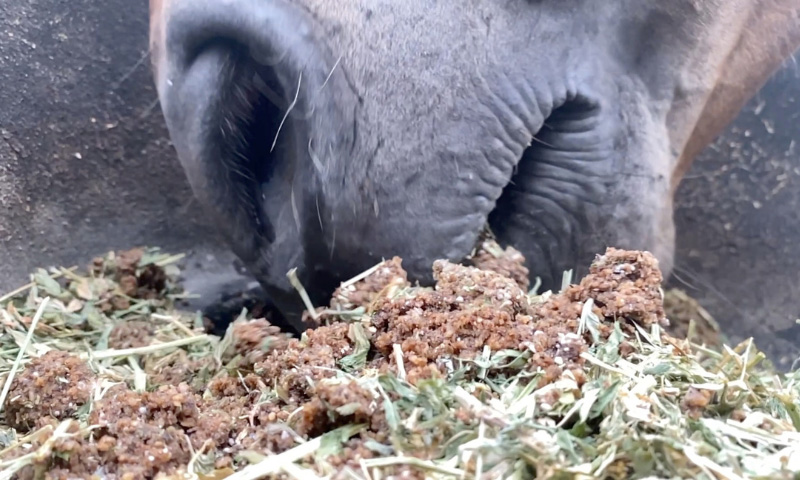When horses bolt down concentrate feeds they are not chewing as thoroughly as what they do hay or grass, and this decreases saliva production and if feed is not moistened thoroughly, they may be at risk of choke.
Here are a few things to try to slow down a greedy eater:
- Mixing chaff with concentrate feeds at 15-50% of the feed can help increase chew time and slow concentrate feed intake;
- Try placing some large, smooth stones/rocks or bricks in feeders along with the concentrate feed as the horse will have to navigate around the obstacle to consume the meal;
- Feeding extruded feeds increases chewing and saliva production;
- Place feed in long shallow feed troughs;
- Fixing a chicken wire ring inside the feed trough so the horse can’t grab large mouthfuls;
- Separate horses at feed time;
- Feed hay in slow feeder hay nets.
If you are worried that your horse is not chewing his feed sufficiently pre-moisten the feed by soaking in water for a few minutes prior to feeding. Soaking feed is very important if you are feeding ingredients such as copra meal, soy hulls and sugar beet pulp as they have a high pectin content and soak up a lot of water causing the feed to swell.
Contact your veterinarian immediately if your horse is showing signs of choke. Horses usually suffer from choke soon after they have consumed feed and often some or all of the following symptoms will follow very quickly (Feige et al, 2000):
- Discharge from both nostrils, usually frothy white or green and contains feed;
- Difficulty swallowing;
- Excessive salivation;
- Coughing, gagging and retching;
- Stretching neck out;
- Opening mouth wide;
- Sweating or signs of discomfort;
- Depression
If you have a horse that has previously suffered from choke it pays to keep a close eye on them at mealtimes, as they seem to be pre-disposed to suffer from repeated episodes of choke. Get a reputable equine dentist to examine your horse’s teeth at least once each year to ensure your horse is able to chew food thoroughly and effectively before it is swallowed.
If you are ever uncertain about your horse’s welfare or state of health contact your local veterinarian for advice.
By Shannon Godwin BAppSc GDTL
